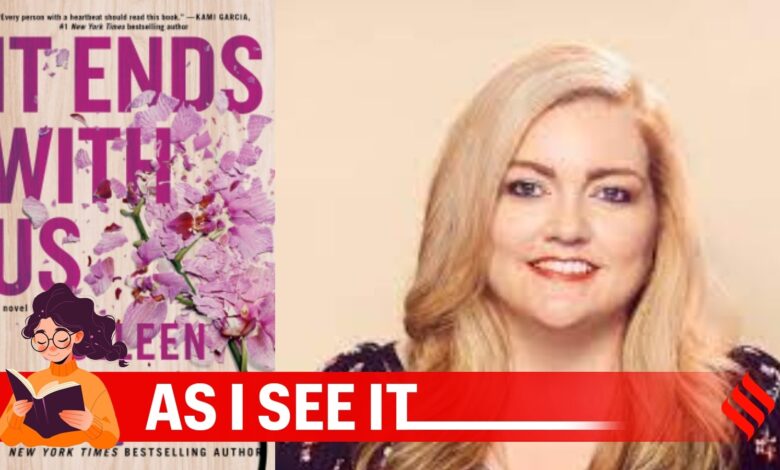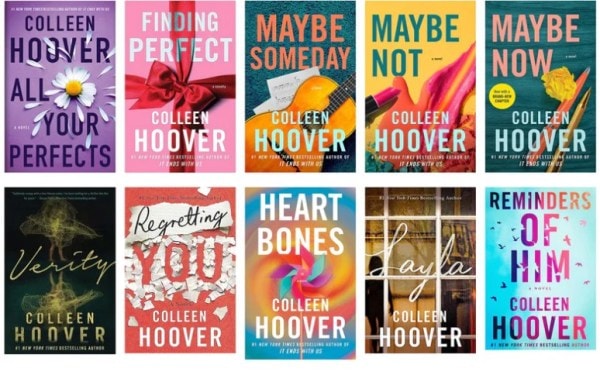A skeptic’s guide to Colleen Hoover: What I discovered when I read her for myself | Books and Literature News

As a reader of romance novels, I picked up one of the most popular (and, for some, overhyped) books of recent years: Colleen Hoover’s It Ends With Us. But this time, I did not choose it because the internet told me to, or because friends recommended it, or because of its pink, flashy cover with flowers shouting, “Hey, I’m the best romance novel a delulu teenager would want to read from the college library.”
This time, my reasons were different. I had heard Colleen Hoover’s name long before I actually encountered her books. In every discussion about her work, I noticed two distinct groups: those who found her writing cliché and unbearable, and those who adored her, almost worshipping her as the goddess of romance. Whenever my curiosity about her novels grew, people around me warned me off: “She writes nonsense in the name of romance,” they’d say. Her stories are so unrealistic you cannot relate to them unless you believe in some fictional, Barbie-like world.
And yet, I never had an answer for why I still wanted to read her. I have always believed that no matter how flawed a writer may be, the essence of love cannot be completely destroyed on the page. That thought left me in a dilemma. Eventually, I decided to find out for myself. For the first time, I picked up one of her novels from my college library, hoping to discover my own answers. At least then, when the debate came up again, I would have something real to say, whether in defense of her work or in disagreement. And that is how I finally gathered the courage to borrow the book that everyone so derisively dismissed as a “romance novel.”
As a writer, Hoover sets up what appears to be a conventional plot: protagonists suffer, then end with a happily-ever-after. But her narrative doesn’t always follow that formula. (Source: colleenhoover.com)
The definition of love
When I began reading It Ends With Us, it felt like a typical romance novel, at least until Ryle entered the story. The character embodies traits we now recognise as “toxic.” Back in 2016, the word may not have been as common, but the behaviour was surely there. When love or care comes with conditions, control, and harm instead of support and respect, it ceases to be love.
As a writer, Hoover sets up what appears to be a conventional plot: protagonists suffer, then end with a happily-ever-after. But her narrative doesn’t always follow that formula. In her books, love doesn’t overpower everything. It is not always black and white, sometimes it is gray. Until the last page, you don’t know what’s going to happen, and that unpredictability is part of her appeal. She writes in a way that makes you feel the character is doing what is right for herself, even if it challenges society’s expectations or the idea that enduring suffering is normal.
Traces of the past in her writing
Even though her stories are fictional, many of Hoover’s characters feel drawn from real life. Love, in her novels, rarely comes easily. Often, a tragedy in the past shadows the present. Hoover’s own life echoes this theme. As a child, she witnessed her father’s violence toward her mother over small things, a trauma that left a deep mark.
Story continues below this ad
As I read more of her work, I began to notice a pattern: love in her world is never simple. To find it, her characters must endure pain, confront trauma, and summon resilience. Her novels are about love, but they are equally about freedom, survival, and the strength to overcome suffering.
More than just “Romance Novels”
 Critics often dismiss Hoover’s work as cliché or unrealistic. But I disagree. Her novels are rarely just about love. (Source: colleenhoover.com)
Critics often dismiss Hoover’s work as cliché or unrealistic. But I disagree. Her novels are rarely just about love. (Source: colleenhoover.com)
Critics often dismiss Hoover’s work as cliché or unrealistic. But I disagree. Her novels are rarely just about love. They carry layers of meaning that often go unnoticed. She addresses societal issues such as domestic violence (It Ends With Us), toxic relationships (Ugly Love), childhood trauma (Hopeless, Losing Hope), and mental health struggles (Without Merit). To label them all “romance novels” is reductive, even unfair.
As a 19-year-old, I might have avoided books tackling such heavy subjects, fearing they would be bleak or repetitive. Yet Hoover writes with such accessibility that you think you’re reading a romance novel, only to realise, by the end, the weight and urgency of the issues she is addressing. These stories reflect real challenges people face, and they can offer hope to those going through similar struggles. Her characters often inspire readers to confront and overcome their own suffering.
The real issue, I believe, is not in her writing but in how her books are marketed. If her stories address serious topics such as domestic violence, toxic relationships, and mental health, they should be presented accordingly. That way, readers would know what they are signing up for. The problem is not her writing. The problem is the marketing.
(The writer is an intern with indianexpress.com)
Story continues below this ad
As I See It is a space for bookish reflection, part personal essay and part love letter to the written word.
